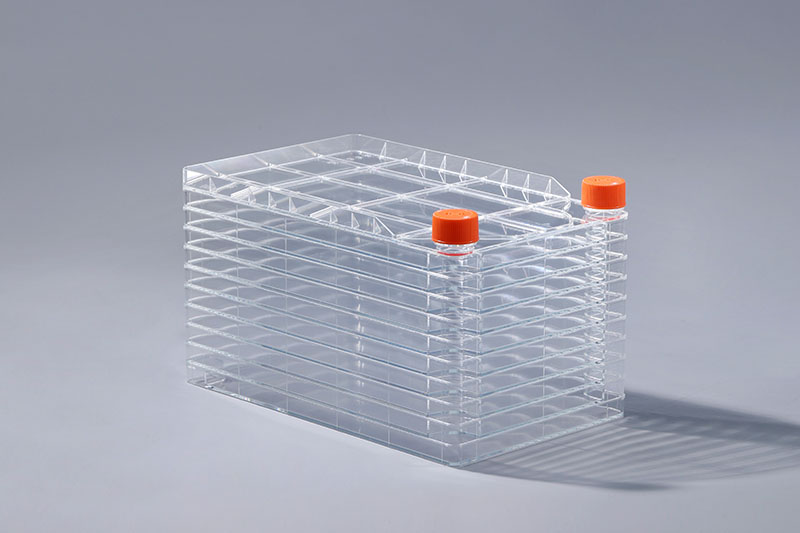, çoğunlukla endüstriyel seri üretimde, laboratuvar işlemlerinde ve büyük ölçekli hücre kültüründe kullanılan ve yapışık hücreler için ideal bir seçim olan çok katmanlı bir hücre kültürü sarf malzemesidir. Bu tür sarf malzemelerini seçerken, önemli bir faktöre, yani yüzey TC işlemine dikkat edeceğiz, neden bu özel işlemden geçmesi gerekiyor?Hücreler iki türe ayrılabilir: yapışkan farklı büyüme yöntemlerine göre hücreler ve süspansiyon hücreleri. Süspansiyon hücrelerinin büyümek için bir desteğe bağlanması gerekmez ve bir kültür ortamında süspansiyon halinde büyüyebilir. Yapışkan hücreler, büyümek için bağlanabilecekleri bir büyüme yüzeyine sahip olmalıdır ve yalnızca hidrofilik bir katı arayüz hücrelerin bağlanmasına izin verebilir. şeffaf polistiren (PS) hammaddeleri. Bir polimer malzeme olarak PS, iyi bir mukavemete ve plastisiteye sahiptir ve toksisitesi yoktur ve tek kullanımlık hücre kültürü sarf malzemeleri için tercih edilen malzeme haline gelmiştir. Bununla birlikte, PS'nin yüzeyi hidrofobiktir ve bu, yapışık hücrelerin büyümesine elverişli değildir. Hücrelerin yapışma performansını arttırmak için, yüzey modifikasyon işleminden geçmek ve hücrelerin daha iyi büyümesine izin vermek için hidrofilik gruplar eklemek gerekir.cell fabrika
Özetle, hücre fabrikası yüzeyinde TC işleminin amacı, yapışık hücrelerin büyümesi. Süspansiyon hücre kültürü için kullanılan sarf malzemelerinin bu tür özel olarak işlenmiş kaplar gerektirmesi gerekmez, ancak yüzey TC işleminden sonraki sarf malzemeleri genellikle süspansiyon hücrelerinin kültürü için de uygundur.
The cell factory is mainly used for the culture of adherent cells, which is processed by injection molding of transparent polystyrene (PS) raw materials. As a polymer material, PS has good strength and plasticity, and has no toxicity, and has become the preferred material for disposable cell culture consumables. However, the surface of PS is hydrophobic, which itself is not conducive to the growth of adherent cells. In order to enhance the adherence performance of cells, it is necessary to undergo surface modification treatment and introduce hydrophilic groups to allow cells to grow better.
In summary, the purpose of TC treatment on the cell factory surface is to adapt to the growth of adherent cells. The consumables used for suspension cell culture do not necessarily require such specially treated vessels, but the consumables after surface TC treatment are generally also suitable for the culture of suspension cells.
The FAI climbed 5.9 percent year-on-year in the first 11 months of 2018, quickening from the 5.7-percent growth in Jan-Oct, the National Bureau of Statistics (NBS) said Friday in an online statement.
The key indicator of investment, dubbed a major growth driver, hit the bottom in August and has since started to rebound steadily.
In the face of emerging economic challenges home and abroad, China has stepped up efforts to stabilize investment, in particular rolling out measures to motivate private investors and channel funds into infrastructure.
Friday's data showed private investment, accounting for more than 60 percent of the total FAI, expanded by a brisk 8.7 percent.
NBS spokesperson Mao Shengyong said funds into weak economic links registered rapid increases as investment in environmental protection and agriculture jumped 42 percent and 12.5 percent respectively, much faster than the average.
In breakdown, investment in high-tech and equipment manufacturing remained vigorous with 16.1-percent and 11.6-percent increases respectively in the first 11 months. Infrastructure investment gained 3.7 percent, staying flat. Investment in property development rose 9.7 percent, also unchanged.
 English
English



















































